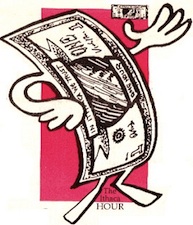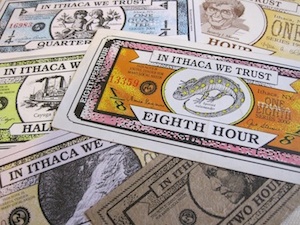
since 1991
The official website of the Ithaca HOURS board of directors is at ithacahours.org Paul Glover consults for grassroots economic development as GreenPlanners.

 |
Ithaca
HOURS
Community Currency
This website is maintained by the founder of
Ithaca HOURS.
since 1991 The official website of the Ithaca HOURS board of directors is at ithacahours.org Paul Glover consults for grassroots economic development as GreenPlanners. |
 |
| HOME | INTRO | CURRENCY | SUCCESSES | HOW-TO BOOK | PUBLICITY | ESSAYS BY GLOVER |
|
United
Workers by Paul Glover
The super-rich, having the most fun, have become more dangerous than crackheads. Their craving for money drives CEOs to clearcut jobs and forests, in order to maximize short-term profit. To enrich investors, millions of American jobs are lost (20 million layoffs since 1987), leading to broken families, scattered communities, worse crime and lower living standards. Nationally, more than 30% of workers now have nontraditional jobs without benefits (Ithaca Journal 9/2/97). These are temps, part-timers, clerks, cashiers, day care workers, home health aides, independent contractors and the self-employed, handcrafters, farmworkers, artists & writers & musicians. Tompkins County's rate of patchwork workers is growing. And few have been unionized. Until now. Locally, we have the lowest unemploy-ment rate in New York state (2.4%), but the highest rate of working poor, thanks significantly to Cornell. Despite the new contract, some university wages are still so low that many staff are eligible for Food Stamps. To this extent, Cornell is on welfare. Cornell and Ithaca College intend to reduce regular staff by several hundred during the next ten years. Cornell's "Project 2000" might cut roughly 2,000 more jobs by the year 2000, according an official at UAW Local 2300. Cornell has increasingly hired temps and independent contractors with few or no benefits. Cornell leads the way downward, as rents, food prices and medical costs rise faster than wages, while workers go deeper into debt. The low unemployment rate here thus masks a high underpaid rate. According to local restaurant cook and writer Gene Katz, "We're on our knees. We're driven by the Giant on the Hill that pays us sludge and keeps the prevailing wage depressed in this area. I'm a cook with over 20 years experience, making $7.00 per hour. That's even considered generous here. I have two kids to support. In almost any other part of the country I'd be making twice that." This wage squeeze affects even professionals. Says Fred Wilcox ("Best Professor" '97 Ithaca Times Reader's Poll), "Ithaca is the most exploited place I've ever worked. The mythology says that this is the coolest place to live. But this is not a cheap place to live. There's 'cheerful exploitation.' I'm shocked and appalled at wages. I've had five books published and have tenure, but still can't pay my bills. We believe in social justice here, but not in the workplace." Lately, there are about 6,500 union workers in Tompkins County, and 45,500 employees without union protection. Until now. United Workers of Ithaca is a unique union because it unites all workers, on a local basis, without regard to occupation, and because it is owned democratically by people who live in Tompkins County. As well, UWI union dues are voluntary, UWI is volunteer-operated rather than professionalized, and employers at locally-owned businesses are considered to be workers. These business owners may have 20% of representation on the UWI board of directors and UWI negotiating teams. Rather than organize the 2,250 Tompkins County workplaces (NYS Dept. Labor: 7/97), shop-by-shop, United Workers of Ithaca simply declares all local workers organized and represented if they want to be. By this process, workers support one another no matter where we work, nor how often we change jobs. We can bypass NLRB bureaucracy to directly address serious labor abuses. We can even unite trade unions which often operate in one workplace without coordination. Our leverage rises from our power to support those businesses which respect workers, and to negotiate with businesses for Most Favored Business status. You're now a union member if you work in the Ithaca area and want job support. Just pick up your UWI union card (even if you're currently unemployed):
If you want to be a voting member, mail your name, address, phone, email to: UWI, Box 362, Ithaca, NY 14851. Your letters are CONFIDENTIAL. If you want the union to be able to organize effectively (to rent meeting rooms, print member cards, newsletter, bumper stickers, etc) you can donate to the address above. Ithaca HOURS welcome. Who will control UWI? Remember that UWI is you. Our first meeting is October 23 at GIAC. United Workers of Ithaca program: This is a union of local workers and locally-owned businesses which celebrates the mutual needs of small businesses and workers, and seeks constructively to resolve employer/employee conflicts and to reduce friction. We envision a community whose businesses thrive because workers thrive. This means that we will reverse the common belief that businesses can only profit by exploiting workers. On the contrary, good working conditions and good pay will mean more sales and better business conditions. United Workers of Ithaca are saying: We expect respect, improved working conditions and fair pay. We will increase loyalty to local businesses which promote the above. This union good for everybody. It is not confrontational, except in rare severe circumstances. This broad-based local union is good for workers, but it's good for good businesses, too. Many small business people are former employees who got tired of getting bossed around. Many of them are still progressive. United Workers of Ithaca (continued from cover) having supported environmental, social justice, labor and peace movements. Many try to treat their employees fairly, though there is a natural amount of conflict between people who work together-especially between employers and employees. Many small business owners are themselves burdened by government regulation, bank loans, taxation, landlords, and chain store competition. They operate on a slim margin. They themselves often work long hours and earn little money. Such employers are part of Ithaca's working class. |
UWI will help Ithacans support these good businesses, AND WILL HELP THESE BUSINESSES SUPPORT THE NEEDS OF ITHACA WORKERS. We will welcome businesses to start here or move to Ithaca which contribute to workforce vitality, and to community stability, rather than those which extract profits from town and then move away. This means creating entry-level and skilled jobs which pay enough so workers don't need public subsidy, which offer training and advancement, which contribute to child care and health benefits, which offer flextime, and which produce goods or services that improve our environment and living conditions. This means businesses whose owners live here and live with the social effects of their decisions. In return, employers need to remember that most workers want to work well, and are capable of sincerely caring about the business if it provides them with respect, good conditions, and reasonable opportunities for crea-tivity. These things are even more important to many workers than the higher pay they also need. As James Curren, owner of Ithaca Books says, "I'm intending to hire someone part-time and pay them a decent base wage, plus offer profit-sharing-some percentage above basic revenue. The benefit to me is that this small workplace feels more cooperative, and my worker can enjoy life without needless hardship. It can be frustrating working for others." YOU SAY YOU DON'T BELIEVE IN UNIONS? Employers do: Hundreds of local businesses join the Chamber of Commerce, and for the 26 biggest low-wage companies (like McDonald's) there's the Employers Group. For indus-trial giants there's the National Association of Manufacturers, and NAFTA and GATT. For international investors there's the Multilateral Agreement on Investments, which would override U.S. labor and environmental standards. The biggest corporations hire political candidates who become elected business lobbyists, who cut corporate taxes and raise yours. The rich are very class-conscious, and workers need to become so also. Unions have gotten a bad rap because some of the biggest once served management and organized crime more effectively than workers, because top union officials became too highly paid, and because some even opposed progressive movements and legislation. Although union pension funds now represent one-third of total assets in the U.S. economy, and 40% of the money in the stock market, they're not invested to make business serve labor. Yet unionism is free enterprise because workers are entrepreneurs too. We're trying to sell our skills to get the best return for our investment of labor. It was the Polish steelworkers of the Solidarity union who led the revolt against anti-democratic, bureaucratic socialism. Now, revived local unionism can lead the revolt against anti-democratic, bureaucratic big business. As Pope John Paul II said, "capital should be at the service of labor, and not labor at the service of capital" (On Human Work, p. 31). Thus, we are creating a Mutual Enterprise System which works for all. Unionism is pro-American when it's pro-democracy. Likewise, to be anti-worker is to be anti-American. The high point of American unionization, with 35% of all workers unionized in 1957,. was based on large industries like steel, coal, and automobiles. Millions of high-paid industrial union workers became the backbone of the Middle Class. Locally, the first union in Ithaca was the Cigarmaker's Union (1873), and you can still see the Cigar Factory sign above 110-114 The Commons. Back then, hundreds of workers paraded down State Street every Labor Day behind fancy banners announcing their trades: Barbers, Carpenters, Bricklayers, and so on. They made sure that they got their fair share of Ithaca's prosperity. When State Street paving first began, in 1876, workers struck for a raise from ten cents per hour to fifteen, and they won. Remember, the only reason you work 40 hours weekly instead of 80, and the only reason you have weekends off, is because workers marched and fought to win a real life, so they could raise kids, relax, and tend a garden. If you're working more than 40 hours per week to pay bills, it's because you haven't had a good union. Now you do. A contract with Ithaca Here are suggested precepts of the UWI social contract. We'll change and improve them at UWI meetings: BENEFITS TO WORKERS
BENEFITS TO BUSINESSES
BENEFITS TO COMMUNITY:
|
RESPONSIBILITIES OF WORKERS
RESPONSIBILITIES OF BUSINESSES
By activating this Contract with Ithaca, balancing the needs of workers and businesses, Ithaca workers of all types will combine talents to rebuild this city as a beautiful and affordable place to work, play, relax, and grow old among our young. Glover is author of Ithaca's first local labor history: Ithaca 100 Years Ago. He has been both an employer and an employee. The United Workers of Ithaca handshake: Can you do the UWI? Regular handshake but with thumbs up, then grasp the other person's upturned thumb with your other hand, while they grasp your thumb. Shake and say "UWI" (pronounced "You-we"). |
| HOME | INTRO | CURRENCY | SUCCESSES | HOW-TO BOOK | PUBLICITY | ESSAYS BY GLOVER |